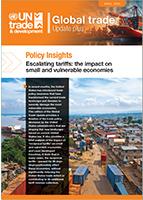
In recent months, the United States has introduced trade policy measures that have reshaped the global trade landscape, including import tariffs of 10% or more on goods from around the world – measures that threaten to severely damage the most vulnerable economies.
This edition of the Global Trade Update provides a timeline of the trade policy decisions and an analysis of the impact of “reciprocal tariffs” on small and vulnerable economies.
These tariffs, currently on pause for 90 days, were calculated at rates to balance bilateral merchandise trade deficits between the US and 57 of its trading partners – ranging from 11% for Cameroon to 50% for Lesotho.
The report finds that in many cases, the reciprocal tariffs disproportionately affect these economies without significantly reducing the US trade deficit or contributing to additional tariff revenue collection. See the March edition of the Global Trade Update for more information on the role of tariffs in trade.
Key points
- Small and least developed countries represent a marginal share of the US trade deficit. For example, 28 of the affected trading partners each contribute less than 0.1% of the total US trade deficit. Yet imposing “reciprocal tariffs” will disproportionately affect their ability to export to the US market.
- Most trading partners facing reciprocal tariffs would generate minimal additional revenue for the US, even if import volumes remain unchanged. For 36 of them, the new tariffs would generate less than 1% of current US tariff revenues. Major oil exporters, such as Guyana and Nigeria, would add very little, as oil is exempt from any additional tariffs.
- Similarly, reciprocal tariffs on countries that primarily export mineral products, such as Zambia and the Democratic Republic of Congo, would generate negligible additional revenue for the US but would further hinder their potential to diversify and add value to their exports.
- Also, several trading partners export agricultural commodities not produced in the US and for which there are few substitutes. For instance, in 2024, the US imported $150 million in vanilla from Madagascar, close to $800 million in cocoa from Côte d’Ivoire and $200 million in cocoa from Ghana. Increasing tariffs on such goods may raise some additional revenue but will also likely increase consumer prices.
The current 90-day pause offers an important opportunity to reassess how small and vulnerable economies are treated under the policy of reciprocal tariffs.


